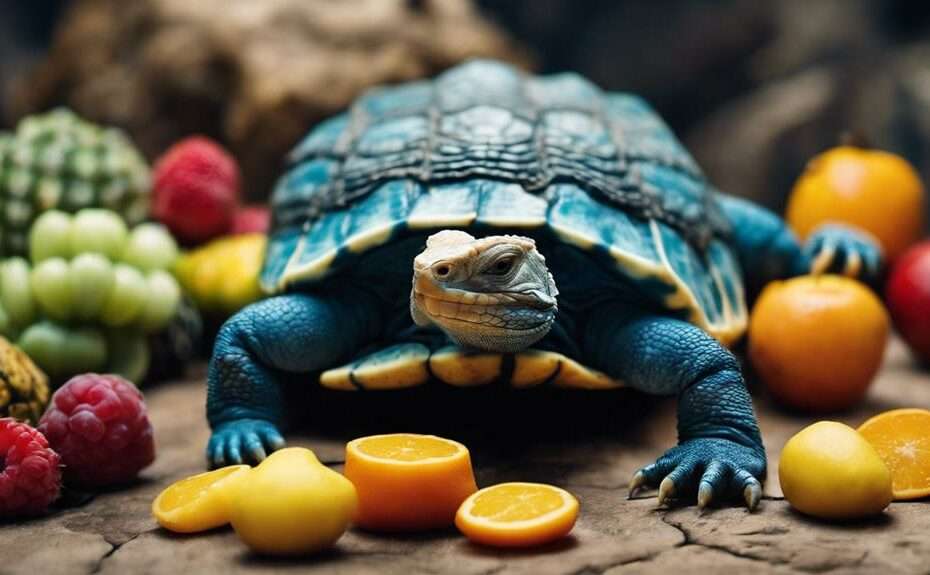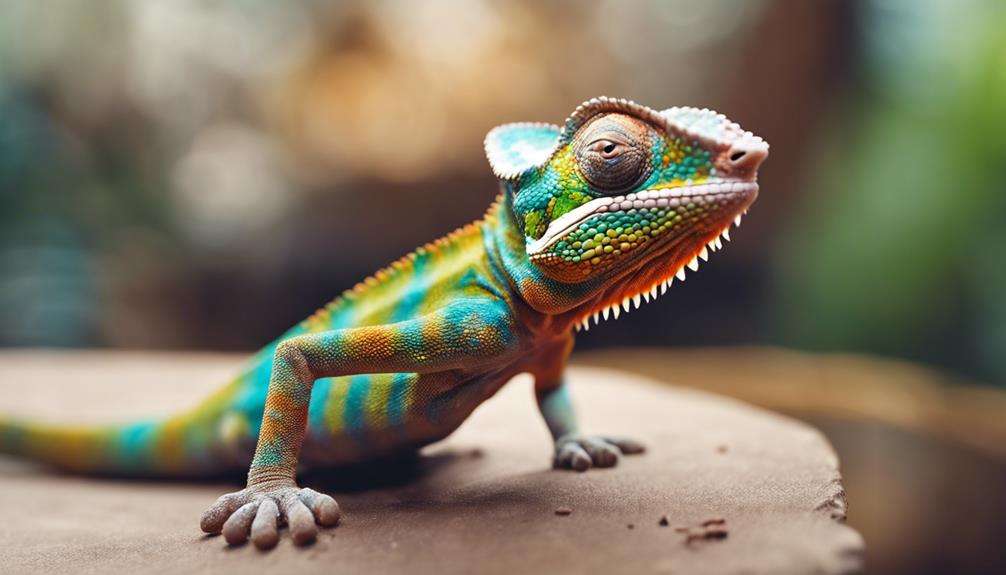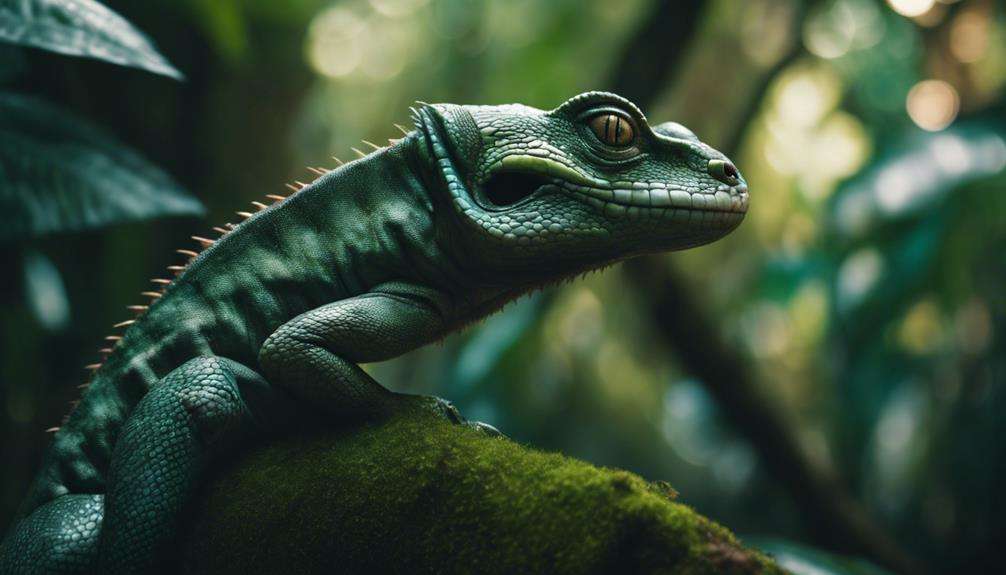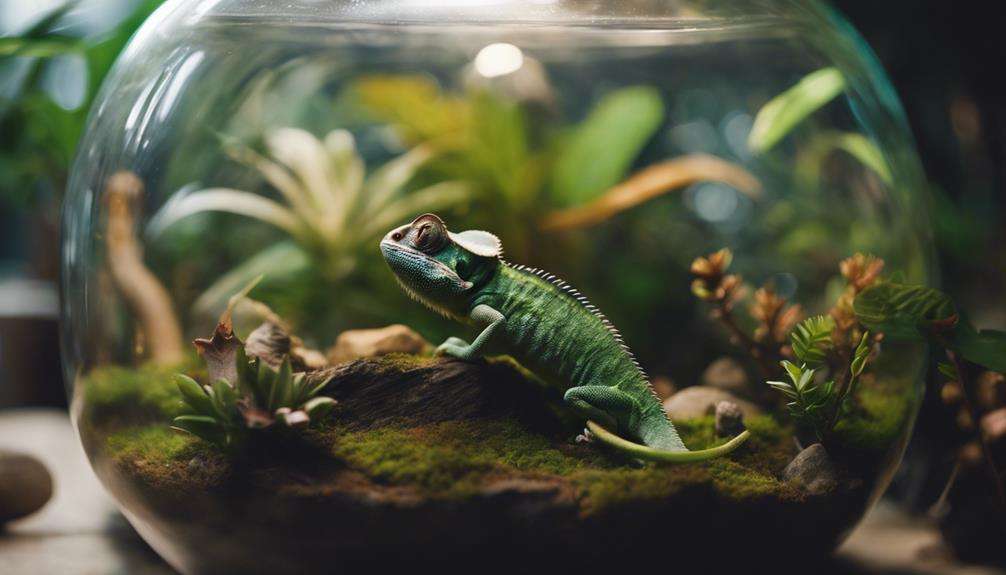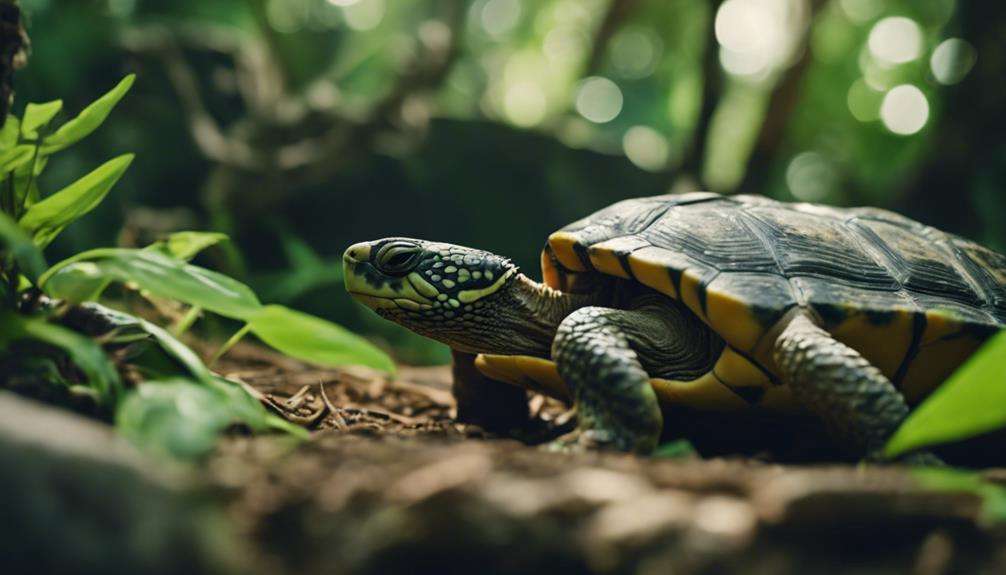You might think that finding the right diet for rare reptiles is a daunting task, given their unique nutritional needs and requirements. However, by following these 10 best diet recommendations, you can ensure the health and vitality of your exotic reptilian companions.
From essential Vitamin D sources to protein-rich prey options, each aspect plays a crucial role in maintaining their well-being.
So, are you ready to discover the key to a balanced and nutritious diet that will keep your rare reptiles thriving?
Key Takeaways
- Tailor calcium supplements to rare reptile species for optimal health.
- Provide diverse prey selection to mimic natural diet and prevent deficiencies.
- Limit fruits and vegetables to avoid imbalances, offer high calcium options.
- Consult with experts for customized diet plans and ensure safety from toxins.
Calcium Supplements for Rare Reptiles
To ensure optimal health and prevent potential calcium-related health issues, rare reptiles often require specialized calcium supplementation tailored to their individual needs and species. Calcium supplements are crucial for rare reptiles as they aid in preventing metabolic bone disease and other related health issues. When considering calcium supplementation for rare reptiles, it's essential to take into account the specific requirements of different reptile species.
Calcium supplements for rare reptiles should be carefully formulated to meet their dietary needs while considering factors such as vitamin D metabolism. Consultation with a veterinarian or reptile nutrition expert is highly recommended to determine the appropriate form and dosage of calcium supplements based on the species and individual requirements of the reptile. Regular monitoring of calcium levels is vital to ensure that supplementation is adequate and adjustments can be made promptly if needed. By providing the right calcium supplements tailored to their species, rare reptiles can maintain good bone health and overall well-being.
Protein-Rich Insects for Reptiles
Protein-rich insects such as crickets, mealworms, and cockroaches offer rare reptiles essential nutrients vital for their health and development.
These insects are packed with protein, calcium, and vitamins necessary for maintaining a balanced diet and preventing deficiencies.
Insect Protein Sources
In rare reptile diets, incorporating a diverse selection of protein-rich insects such as crickets, mealworms, and dubia roaches is essential to ensure the intake of crucial nutrients.
When considering insect protein sources for rare reptiles, here are some key points to keep in mind:
- Insect protein sources like crickets, mealworms, and dubia roaches are rich in essential nutrients for rare reptiles.
- These insects provide a high-quality protein source that helps meet the dietary needs of insectivorous reptiles.
- Gut-loading insects with nutritious foods before feeding them to reptiles enhances their nutritional value.
- Insects offer a diverse range of amino acids and minerals crucial for the health and well-being of rare reptiles.
Nutritional Benefits
When considering the nutritional benefits of incorporating protein-rich insects into the diets of rare reptiles, it's crucial to understand the significant role these insects play in providing essential amino acids for muscle development, growth, and overall health.
Protein-rich insects such as crickets, mealworms, and Dubia roaches offer high protein content essential for the well-being of rare reptiles. These insects help mimic the natural diet of many rare reptiles, promoting vitality and overall health.
Variability in insect selection is vital to ensure a balanced diet, providing rare reptiles with a diverse range of nutrients. Proper gut-loading and dusting of insects with calcium and multivitamin supplements further enhance their nutritional value for rare reptiles, supporting their overall health and vitality.
Fresh Fruits and Vegetables

To ensure optimal health and nutrition for rare reptiles, careful consideration must be given to the selection and variety of fresh fruits and vegetables offered in their diet. When it comes to incorporating fresh produce into the diet of rare reptiles, here are some key points to keep in mind:
- Limitation is Key: Fresh fruits and vegetables should be limited in the diet of rare reptiles to prevent kidney stones and imbalances in essential nutrients.
- Variety is Essential: Offering a variety of fresh fruits and vegetables is crucial to provide a range of vitamins, minerals, and fiber for overall health.
- Focus on High Calcium Options: High calcium fruits and vegetables like kale, collard greens, and dandelion greens can help meet the calcium needs of rare reptiles.
- Avoid Citrus Fruits: It's advisable to avoid feeding citrus fruits to reptiles as they can be high in acid and may cause digestive issues.
Gut Loading Prey Items
Careful consideration must be given to the nutritional enrichment of prey items for rare reptiles, particularly through the process of gut loading with nutrient-rich foods. When preparing feeder insects for rare reptiles, it's crucial to maximize their nutritional value by providing them with a diet that enhances their own nutrient content. By consuming a diet rich in vitamins and minerals, the prey items become a valuable source of nutrition for the reptiles that feed on them. This practice ensures that rare reptiles receive essential nutrients that may be lacking in their primary diet.
Common gut loading foods for feeder insects include a variety of vegetables, fruits, and commercial gut loading diets specially formulated to boost their nutritional value. These foods are carefully selected to provide a balanced diet that meets the unique dietary requirements of rare reptiles. Properly gut loaded prey items can help prevent nutritional deficiencies and support the overall health and well-being of these exotic animals. Through this process, keepers can ensure that their rare reptiles receive a well-rounded and enriched diet tailored to their specific needs.
Hydration and Water Sources
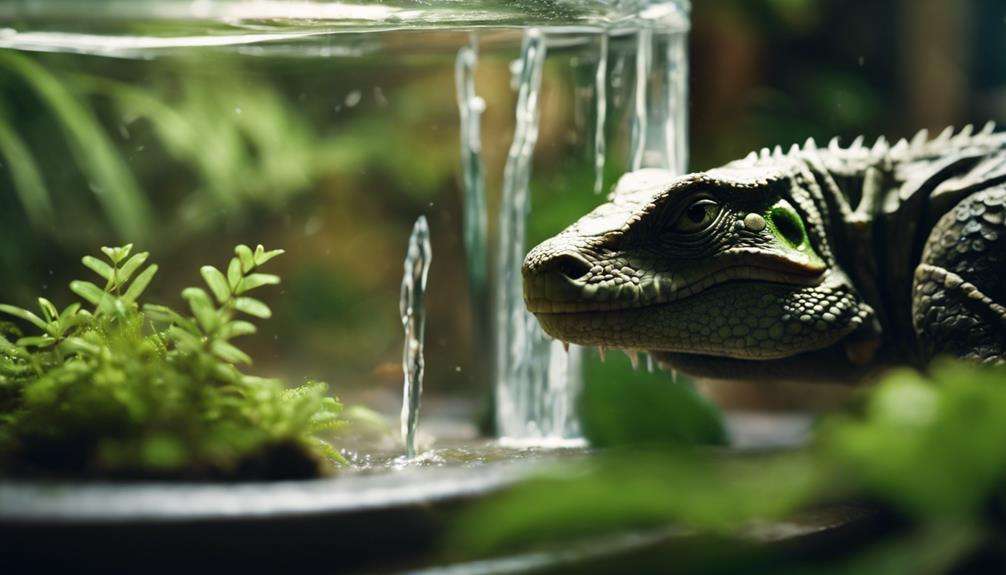
Ensuring rare reptiles have access to fresh, clean water is essential for maintaining their hydration levels. When caring for bearded dragons and other lizard species, it's crucial to pay attention to their water sources and hydration needs. Here are some key points to consider:
- Water Source Preferences: Some rare reptiles may have specific preferences for water sources, such as still water or running water. It's essential to observe your reptile's behavior to determine their preference.
- Monitoring Hydration Levels: Regularly monitor your rare reptile's water intake to ensure they're adequately hydrated. Dehydration can lead to serious health issues, so it's vital to keep track of their hydration levels.
- Impact of Humidity: The humidity levels in the enclosure can also affect the hydration needs of rare reptiles. Make sure the humidity levels are appropriate for your specific reptile species.
- Variety of Water Sources: Offering a variety of water sources, such as shallow dishes and misting systems, can help rare reptiles stay hydrated. Experiment with different options to see what works best for your pet.
Variety in Prey Selection
When selecting prey for rare reptiles, consider offering a range of sizes to accommodate different species' needs. This variation ensures a diverse intake of essential nutrients crucial for their health and well-being.
Additionally, incorporating a mix of prey with varying nutritional contents can help mimic their natural diet and prevent deficiencies.
Prey Size Variation
To ensure rare reptiles receive a balanced diet that meets their nutritional needs, offering a variety of prey sizes is essential. When considering prey size variation for rare reptiles, keep the following points in mind:
- Species Specificity: Different rare reptile species have varying prey size requirements based on their natural feeding habits and digestive capabilities.
- Age and Size Consideration: Adjust prey size according to the reptile's age and size to prevent feeding-related issues like choking or inadequate nutrition.
- Feeding Behavior Simulation: Varying prey sizes can mimic natural feeding behaviors, providing mental stimulation and promoting healthy eating habits.
- Digestive Health: Providing a mix of small, medium, and large prey items helps rare reptiles maintain proper digestive function and overall health.
Nutritional Content Variety
Considering the nutritional requirements of rare reptiles, the variety in prey selection plays a crucial role in meeting their specific dietary needs and promoting overall health. Including a diverse range of prey items such as insects, rodents, birds, and larvae ensures a balanced intake of essential nutrients, vitamins, and minerals crucial for the well-being of rare reptiles.
Rotation of prey types can prevent nutritional imbalances and deficiencies. This variety in prey selection mimics the natural diet of rare reptiles, supporting their unique nutritional requirements. When obtaining prey items from pet stores, ensure they're of high quality and free from any harmful chemicals.
Additionally, providing access to natural sunlight or using a UVB bulb is essential for green iguanas to synthesize vitamin D3 for proper calcium absorption.
Behavioral Enrichment Through Prey
By incorporating a diverse range of prey items in their diet, rare reptiles can engage in natural hunting behaviors, enhancing both physical activity and mental stimulation. This behavioral enrichment through prey variety is crucial for their overall well-being.
Here's how you can achieve this for your rare reptile:
- Stimulating Natural Instincts: Different prey types offer varying textures and tastes, encouraging natural hunting behaviors.
- Nutritional Benefits: Rotation of prey items provides a diverse array of nutrients essential for rare reptile health.
- Preventing Imbalances: Varying prey selection prevents dietary imbalances and ensures a well-rounded diet.
- Reducing Stress: Behavioral enrichment through prey variety can reduce stress and boredom, promoting a healthier environment for your rare reptile.
Essential Vitamins for Reptiles
Reptiles, particularly those kept indoors, may require vitamin D3 supplementation to prevent deficiencies, essential for their calcium absorption, bone health, and overall metabolic functions. Vitamin D is crucial for reptiles as it aids in these vital processes.
While reptiles can synthesize vitamin D3 through exposure to UVB lighting, supplementation becomes crucial in captivity due to limited exposure. Plant-based sources of vitamin D2 mightn't be as effective for reptiles compared to vitamin D3, making supplementation more necessary.
Regular veterinary check-ups are essential to monitor vitamin levels and ensure proper supplementation for rare reptiles. By providing the necessary vitamin D3, you can help prevent deficiencies, support healthy bone development, and maintain optimal metabolic functions in your reptilian companion.
Avoiding Toxic Plants and Foods
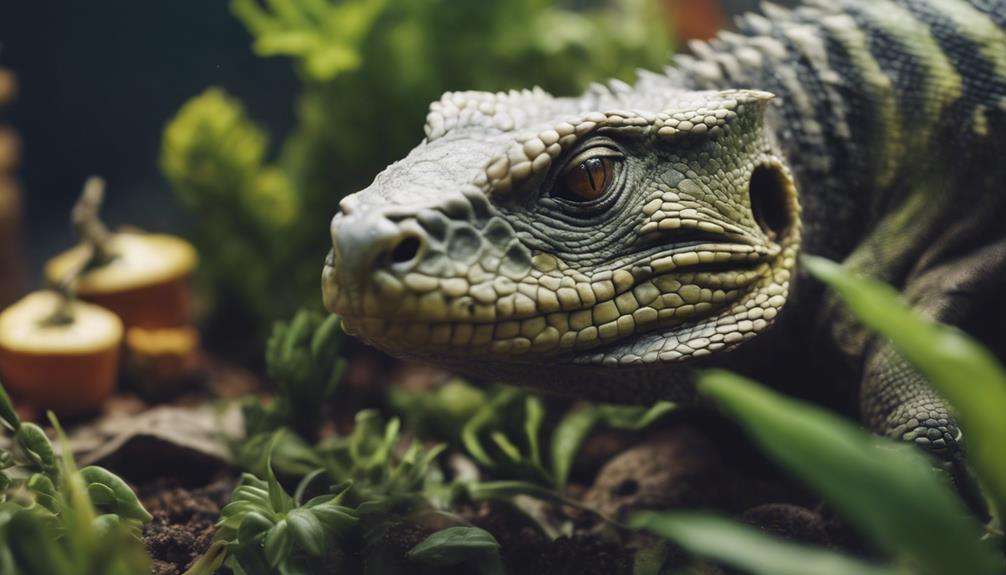
When caring for rare reptiles, it's crucial to be aware of the potential dangers posed by toxic plants and foods. Avocado, rhubarb, and specific mushrooms are examples of items that can be harmful to these reptiles.
Educate yourself on safe plant choices, harmful food items, and strategies to prevent poisoning risks to ensure the well-being of your rare reptile.
Safe Plant Choices
Ensure the health and well-being of rare reptiles by meticulously selecting non-toxic plants for their diet. When choosing plants for rare reptiles, consider the following:
- Research Safe Options: Look into safe plant choices to avoid any plant toxicity risks.
- Consult with Experts: Seek advice from a reptile veterinarian or specialist to create a safe plant list for rare reptiles.
- Avoid Common Toxic Plants: Steer clear of plants like philodendron, pothos, and dieffenbachia known to be harmful.
- Incorporate Nutritious Plants: Opt for safe and nutritious options like dandelion greens, hibiscus flowers, and mulberry leaves to enrich the diet of rare reptiles.
Harmful Food Items
Avoiding toxic plants and foods is essential for maintaining the health and safety of rare reptiles. Toxic plant dangers such as philodendron, ivy, and daffodils can lead to gastrointestinal issues and organ damage in reptiles.
It's crucial to steer clear of feeding rare reptiles harmful foods like avocado, onions, and garlic, as these can be potentially fatal. Additionally, harmful insecticides from certain insects like fireflies and beetles should be avoided in a rare reptile's diet due to their toxicity.
Furthermore, caution should be exercised when offering wild-caught prey to rare reptiles, as these prey items may have ingested toxic substances from their environment. To ensure the diet's safety for rare reptiles, it's advisable to research and consult with a reptile specialist to avoid poisonous prey items.
Preventing Poisoning Risks
To safeguard the health of rare reptiles, it's crucial to identify and steer clear of toxic plants and foods that can pose poisoning risks if ingested. Here are some essential tips to prevent poisoning risks for your rare reptiles:
- Avoid Poisonous Plants: Stay away from toxic plants like philodendron, dieffenbachia, and lilies that can be harmful if consumed.
- Substitute Toxic Foods: Be cautious of toxic foods such as avocado, rhubarb, and onions; opt for safer alternatives to prevent poisoning.
- Choose Reptile-Safe Landscaping: Research reptile-safe landscaping options like spider plants, bamboo, and orchids to create a secure environment.
- Consult Experts: Seek advice from a veterinarian or herpetologist to select safe plants and identify potential hazards for your rare reptiles.
Feeding Frequency and Schedule
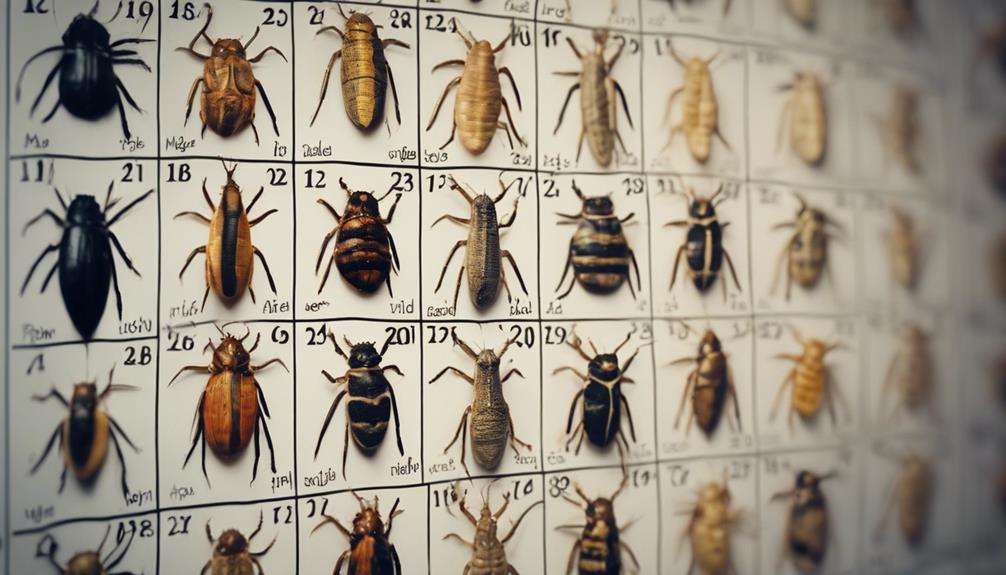
Rare reptiles exhibit varied feeding frequency needs that are influenced by factors such as species, age, and health condition. Feeding frequency variations are crucial to support growth rates, with younger reptiles often requiring more frequent meals compared to adults.
Seasonal feeding patterns should also be considered, as some species may have metabolic needs that fluctuate throughout the year. Age-specific feeding guidelines are essential, as juveniles may need daily feedings while adults can thrive on a less frequent schedule.
Additionally, health considerations play a significant role in determining the feeding schedule for rare reptiles with specific dietary requirements. Consulting with a reptile veterinarian or specialist is paramount in establishing an appropriate feeding routine tailored to the individual needs of the reptile.
Monitoring weight, body condition, and behavior can aid in adjusting the feeding frequency to ensure optimal nutrition and overall health for these unique reptiles.
Consulting a Reptile Nutritionist
Engage a reptile nutritionist to develop a customized diet plan tailored to the specific needs of your rare reptile species. When consulting a reptile nutritionist, you can expect the following:
- Customized Plans, Individualized Care: A reptile nutritionist will create a diet plan that considers the unique species, age, and health status of your rare reptile, ensuring individualized care.
- Species Specific Diets, Tailored Nutrition: By working with a nutritionist, you'll receive recommendations for species-specific diets that provide tailored nutrition to meet your reptile's specific requirements.
- Health Optimization, Longevity Benefits: Reptile nutritionists offer expertise in formulating balanced diets that optimize health and provide longevity benefits for your rare reptile.
- Professional Guidance: With professional guidance, you can address any dietary deficiencies or imbalances that may impact your pet's well-being, ensuring the best care possible.
Frequently Asked Questions
What Is the Best Feed for Reptile?
When feeding reptiles, consider their feeding frequency, dietary supplements, and feeding behavior. These aspects are crucial in ensuring their nutritional needs are met, promoting their health and well-being. Always monitor their diet closely.
What Are the Nutritional Requirements for Reptiles?
To ensure optimal health for your rare reptile, understand their specific nutritional requirements. Consider factors like calcium supplementation, varied protein sources, hydration needs, and gut loading techniques. These elements are crucial for maintaining their well-being.
What Is the Most Favorable Food for Most Lizard?
For most lizards, a diet rich in insect variety like crickets and roaches is essential. Calcium supplements and gut loading techniques ensure optimal health. Balancing with leafy greens and occasional fruits like berries or squash provides necessary nutrients.
What Best Describes the Diet of Reptiles?
Eating habits among reptiles vary; some munch on plants, others devour creatures, and a few enjoy a mix. To maintain rare reptiles' health, you must balance their diet with leafy greens, insects, and the right supplements.
Conclusion
In conclusion, remember to meticulously manage the diet of rare reptiles to maintain their health and vitality. Prioritize providing proper hydration, protein-rich insects, and essential vitamins to prevent deficiencies.
Consistently consult a reptile nutritionist to ensure a balanced and beneficial diet plan. By following these recommendations, you can help safeguard the well-being of your rare reptilian companions.
